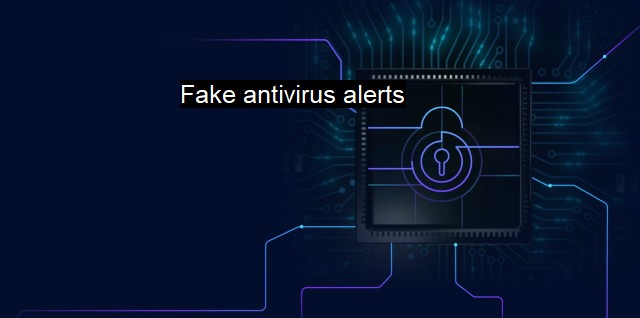What are Fake antivirus alerts?
How to Avoid Falling for Fake Antivirus Alerts: A Rising Threat to Online Security
In the realms of cybersecurity and antivirus measures, the concept of "fake antivirus alerts" holds a significant stance. Popularly referred to as "scareware," these deceptive software programs trick the user into thinking that their computer is highly vulnerable or infected with dangerous malware or spyware. The term "fake antivirus alerts" is somewhat self-explanatory: it emerges as a false security warning that feigns the identification of non-existent computer viruses, typically aimed at encouraging users to take some action, notably buying a full version of the said 'antivirus software.'Fake antivirus alerts generally induce a panic reaction in users, efficiently guided by the program's advertisement strategy: hard-hitting alerts combined with a synchronized, alarming visual impact may emotionally voice the urgency to buy the antivirus. Often, users scramble to nullify the 'detected threats,' thereby falling into the trap set by cybercriminals pushing their malware-ridden 'antivirus software.' Hence, fake antivirus alerts are not simply lighthearted scams but serve as entry points for more serious cyber threats, such as ransomware, adware, and spyware.
A typical fake antivirus alert begins with intrusive pop-ups on the user's screen, regardless of the task at hand. The language used in these alerts is designed to elicit a sense of fear, throwing in terminologies like 'final warning,' 'severe risk,' 'critical alert,' or 'virus detected.' A countdown timer may accompany these alarmist phrases, enhancing the psychological distress, coercing the user to act hastily.
Then, the user is led to download the 'antivirus software,' which is essentially a malware in disguise. In certain instances, clicking on the alerts redesigned to look like legit Windows alert messages could instantaneously install this program without further user participation. Regardless of its method of entry, once this devil in disguise slips past the system's defenses, it harasses the user with inflated, non-stop 'security warnings.' it prompts the user to purchase the “full version” of the software product to wipe out these supposed system threats.
Although they're disguised to have a professional-looking interface that imitates legitimate antivirus programs, there’s a sinister ulterior motive: exploiting the user's panic. To unlock the removal ability turned 'mandatory necessity', the scareware demands a monetary transaction. Apart from the immediate financial loss, the cybercriminals gain access to the user's credit card information - a blatant invasion of their privacy.
Being cognizant of certain points can prevent falling prey to such scareware. First off, understanding that legit antivirus programs wouldn't enforce immediate payment or rush the users into downloading anything is essential. Users should keep in mind that legitimate antivirus software often already comes installed on the system or is accomplished through an authorized retailer. Reliable security software will not resort to fearmongering; instead, they follow a discreet protocol if a threat is detected.
It’s critical for users to regularly update their systems and maintain a reputable antivirus program. Many of these fake antivirus alerts are programmed to exploit known security holes in software applications; hence, staying updated indirectly contributes to increased system defense.
Regrettably, the growing sophistication of cybercrime strategies means that fake antivirus alerts continue to ensnare victims as they imitate legitimate security threats convincingly. with an informed disposition, one can intuit wisely in the face of such scam alerts. Understanding what fake antivirus alerts are and how they work enables internet users to minimize the catastrophic risk they pose to their personal data, privacy, and system functionality.

Fake antivirus alerts FAQs
What are fake antivirus alerts and how do they work?
Fake antivirus alerts are a type of cyber scam where an attacker creates a fake security alert that appears to be from an antivirus program. These alerts often claim that your computer is infected with malware and prompt you to download or pay for a fake antivirus program. Once installed, the fake program can actually infect your computer with malware or steal your personal information.How can I tell if an antivirus alert is fake?
Fake antivirus alerts often have spelling and grammatical errors, use scare tactics to pressure you into taking action, and ask for personal or financial information. They may also appear as pop-ups or web browser notifications instead of coming from your actual antivirus program. To verify if an alert is legitimate, open your antivirus program and run a scan, or contact the official support channels for your antivirus software.What should I do if I receive a fake antivirus alert?
If you receive a fake antivirus alert, do not click on any links or download any programs. Instead, close the alert and run a scan using your actual antivirus software. You can also report the scam to the Federal Trade Commission (FTC) at ftc.gov/complaint or the Anti-Phishing Working Group at reportphishing@apwg.org.How can I protect myself from fake antivirus alerts?
To protect yourself from fake antivirus alerts, keep your antivirus software up-to-date and only download programs from official sources. Be cautious of pop-ups or notifications that ask for personal or financial information, and always verify the legitimacy of an alert before taking action. It is also important to educate yourself on common cybersecurity threats and scams, and to use strong passwords and multi-factor authentication to protect your accounts.| | A | | | B | | | C | | | D | | | E | | | F | | | G | | | H | | | I | | | J | | | K | | | L | | | M | |
| | N | | | O | | | P | | | Q | | | R | | | S | | | T | | | U | | | V | | | W | | | X | | | Y | | | Z | |
| | 1 | | | 2 | | | 3 | | | 4 | | | 7 | | | 8 | | |||||||